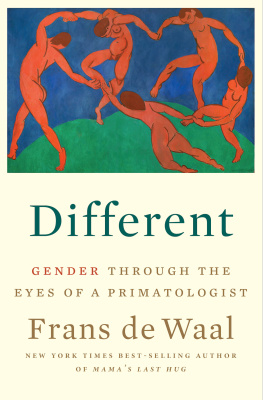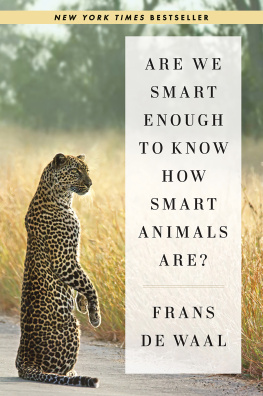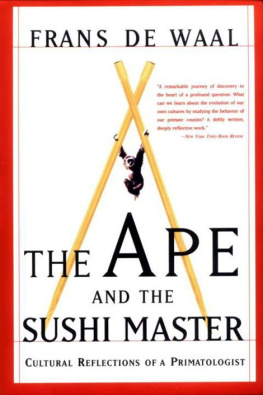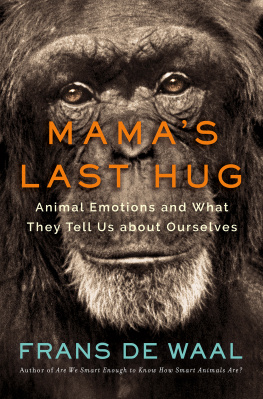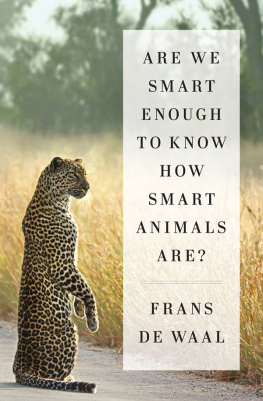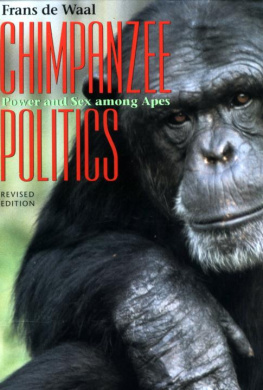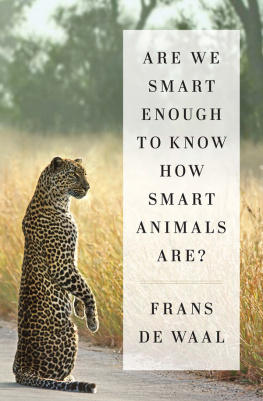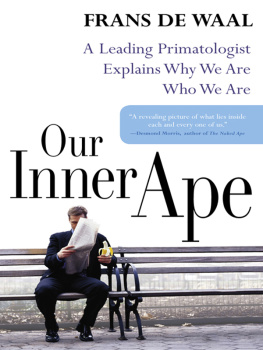
THE BONOBO
and
THE ATHEIST
In Search of Humanism
Among the Primates
FRANS DE WAAL
with drawings by the author

For Catherine, my favorite primate
CONTENTS
Is man only a blunder of God? Or is God only a blunder of man?
Friedrich Nietzsche
I was born in Den Bosch, the Dutch city after which Hieronymus Bosch named himself. This doesnt make me an expert on the painter, but having grown up with his statue on the market square, I have always been fond of his surrealist imagery, his symbolism, and how it relates to humanitys place in the universe under a waning influence of God.
His famous triptych in which naked figures frolic around, The Garden of Earthly Delights , is a tribute to paradisiacal innocence. The middle tableau is far too happy and relaxed to fit the interpretation of depravity and sin advanced by puritan experts. It shows humanity free from guilt and shame either before the Fall or without any Fall at all. For a primatologist like myself, the nudity, the allusions to sex and fertility, the plentiful birds and fruits, and the moving about in groups are thoroughly familiar, and hardly in need of a religious or moral interpretation. Bosch seems to have depicted us in our natural state, while reserving his moralistic outlook for the right-hand panel, in which he punishes not the frolickers from the middle panel but monks, nuns, gluttons, gamblers, warriors, and drunkards. Bosch was no fan of the clergy and their avarice, which explains a small detail in which a man resists signing his fortune away to a pig veiled like a Dominican nun. The poor figure is said to be the painter himself.
Five centuries later, we remain embroiled in debates about the place of religion in society. As in Boschs day, the central theme is morality. Can we envision a world without God? Would this world be good? Dont think for one moment that the current battle lines between fundamentalist Christianity and science are determined by evidence. One has to be pretty immune to data to doubt evolution, which is why books and documentaries aimed at convincing the skeptics are a waste of effort. They are helpful for those prepared to listen, but fail to reach their target audience. The debate is less about the truth than about how to handle it. For those who believe that morality comes straight from God the creator, acceptance of evolution would open a moral abyss. Listen to the Reverend Al Sharpton debating the late atheist firebrand Christopher Hitchens: If there is no order to the universe, and therefore some being, some force that ordered it, then who determines what is right or wrong? There is nothing immoral if theres nothing in charge. Similarly, I have heard people echo Dostoevskys Ivan Karamazov, exclaiming, If there is no God, I am free to rape my neighbor!
Perhaps its just me, but I am wary of any persons whose belief system is the only thing standing between them and repulsive behavior. Why not assume that our humanity, including the self-control needed for a livable society, is built into us? Does anyone truly believe that our ancestors lacked social norms before they had religion? Did they never assist others in need, or complain about an unfair deal? Humans must have worried about the functioning of their communities well before current religions arose, which occurred only a couple of millennia ago. Biologists are unimpressed by that kind o f timescale.
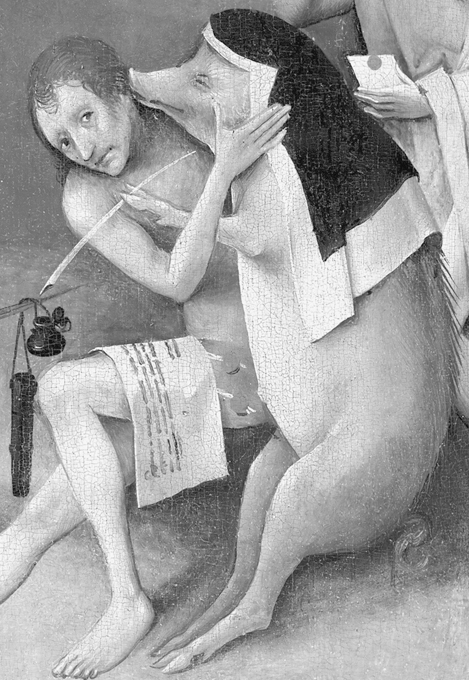
In the lower right-hand corner of The Garden , Bosch depicted himself resisting a pig dressed like a nun, who tries to seduce him with kisses. She is offering salvation in return for his estate (hence the pen, ink, and official-looking paper). The Garden was painted around 1504, about a decade before Martin Luther galvanized protest against such church practices.
The Dalai Lamas Turtle
The above introduced a blog entitled Morals without God? on the New York Times website, in which I argued that morality antedates religion and that much can be learned about its origin by considering our fellow primates. Contrary to the customary blood-soaked view of nature, animals are not devoid of tendencies that we morally approve of, which to me suggests that morality is not as much of a human innovation as we like to think.
This being the topic of the present book, let me lay out its themes by describing the week that followed my blogs publication, including a trip to Europe. Right before this, however, I attended a meeting between science and religion at Emory University, in Atlanta, where I work. The occasion was a forum with the Dalai Lama on his favorite theme: compassion. Being compassionate seems to me an excellent recommendation for life; hence I welcomed the message of our honorable guest. As the first discussant, I was seated next to him surrounded by a sea of red and yellow chrysanthemums. I had been instructed to address him as your holiness, but to speak of him to others as his holiness, which I found sufficiently confusing that I avoided all forms of address. One of the most admired men on the planet dropped his shoes and folded his legs under him in his chair, put on a huge baseball cap color-matched to his orange robe, while an audience of over three thousand people hung on his every word. Before my presentation, I had been appropriately deflated by the organizers reminding me that no one had come to hear me speak, and that all those people were there only for his pearls of wisdom.
In my remarks, I reviewed the latest evidence for animal altruism. For example, apes will voluntarily open a door to offer a companion access to food, even if they lose part of it in the process. And capuchin monkeys are prepared to seek rewards for others, as we see when we place two of them side by side, while one of them barters with us with differently colored tokens. One token rewards only the monkey itself, whereas the other rewards both monkeys. Soon, the monkeys prefer the prosocial token. This is not out of fear, because dominant monkeys (who have least to fear) are in fact the most generous.
Good deeds also occur spontaneously. An old female, Peony, spends her days outdoors with other chimpanzees at the Yerkes Primate Centers field station. On bad days, when her arthritis is flaring up, she has trouble walking and climbing, but other females help her out. Peony may be huffing and puffing to get up into the climbing frame in which several apes have gathered for a grooming session. But an unrelated younger female moves behind her, placing both hands on her ample behind to push her up with quite a bit of effort, until Peony has joined the rest.
We have also seen Peony get up and slowly move toward the water spigot, which is at quite a distance. Younger females sometimes run ahead of her, take in some water, then return to Peony and give it to her. At first, we had no idea what was going on, since all we saw was one female placing her mouth close to Peonys, but after a while the pattern became clear: Peony would open her mouth wide, and the younger female would spit a jet of water into it.
Such observations fit the emerging field of animal empathy, which deals not only with primates but also with canines, elephants, and even rodents. A typical example is how chimpanzees console distressed parties, hugging and kissing them, which is so predictable that we have documented literally thousands of cases. Mammals are sensitive to each others emotions and react to those in need. The whole reason people fill their homes with furry carnivores, and not with, say, iguanas and turtles, is that mammals offer something no reptile ever will. They give affection, they want affection, and they respond to our emotions the way we do to theirs.
Next page




